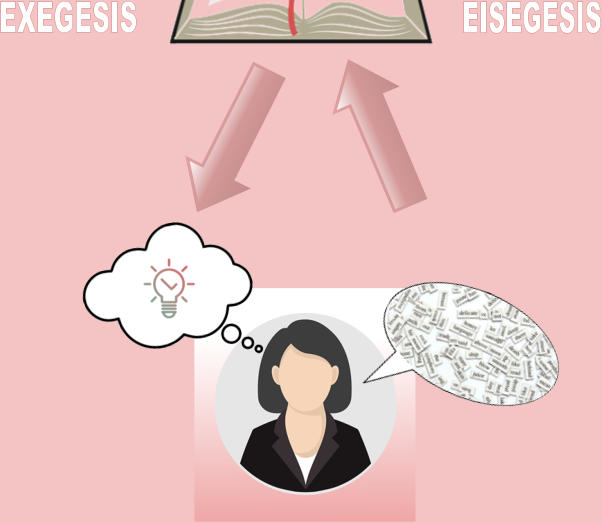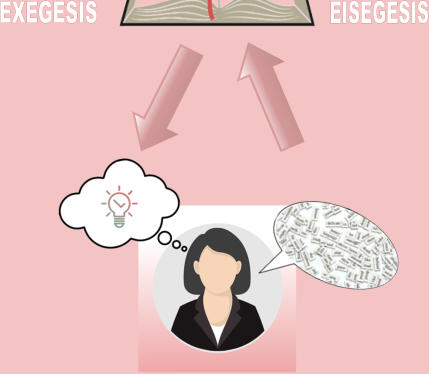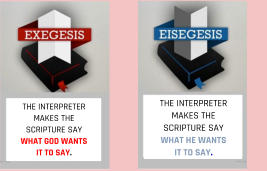“Peter,
turning
around,
saw
the
disciple
whom
Jesus
loved
following
them
….
Peter
therefore
seeing
him
said
to
Jesus,
‘Lord,
and
what
about
this
man?’
Jesus
said
to
him,
‘If
I
want
him
to
remain
until
I
come,
what
is
that
to
you?
You
follow
Me!’
This
saying
therefore
went
out
among
the
brethren
that
that
disciple
would
not
die;
yet
Jesus
did
not
say
to
him
that
he
would
not die, but only, ‘If I want him to remain until I come, what is that to you?’”
(John 21:20-23)
Exegesis and Eisegesis
This
text
well
illustrates
the
difference
between
two
words
which
vary
but
little
in
form,
though
widely
in
meaning.
Both
“
ex
egesis”
and
“
eis
egesis”
are
derived
from
the
same
Greek
root,
ago
,
meaning
“to
lead,
draw,
or
bring.”
Yet,
the
prepositional
prefixes,
ex
and
eis
,
which
mean
“out
of”
and
“into,”
respectively,
are
enough
to
create
words
with
quite
opposite
meanings.
Thus,
“
ex
egesis”
means
to
“lead,
draw,
or
bring
out
”
the
ideas
of
a
text,
or
“to
explain
or
interpret
its
meaning.”
“
Eis
egesis,”
on
the
other
hand,
means
to
“lead,
draw,
or
bring
[a
meaning]
into
”
a
text.
So,
it
all
comes
down
to
whether
the
Bible
reader
“leads
into”
the
text
his
own
ideas
or
“leads
out
of”
it
the
ideas
of
the
author,
who,
in
this
case,
is
God.
Of
course,
the
temptation
to
do
the
latter
results from the reader’s wish to give his ideas the ring of divine legitimacy.
Thus,
a
few
letters’
difference
in
two
little
prepositions
quite
literally
spells
a
huge
and
infinitely
critical
difference
in
meaning.
It
is
the
difference
between
what
the
Bible
actually
means
and
what
the
reader
wants
it
to
mean
.
If
it
is
asked
why
people
can
read
the
same
Bible
and,
yet,
come
to
so
many
differing
conclusions
as
to
what
it
means,
it
is
really
no
harder
to
understand
than
the
difference
between
these
two
words.
Understanding
the
Bible
depends
on
whether
the
reader
truly wishes to “bring
out
” its ideas. Otherwise, he will simply “bring
into
” it his own ideas.
The
first
generation
of
Christians
appears
to
have
wanted
and
expected
Christ
to
return
within
their
lifetimes
(cf.
2
Pet.
3:3,4).
If
so,
perhaps
this
explains
why
they
“read
into”
Christ’s
words
to
Peter
about
the
“disciple
whom
He
loved”
a
meaning
which
He
neither
intended
nor
His
words
rightly
bear.
Thus,
all
that
was
necessary
for
John
to
correct
this
misinterpretation
of
His
words
was
simply
to
repeat
them.
This
shows
that
nothing
more
is
needed
to
understand
what
Jesus
meant
than
a
careful
and
honest
reading
of
His
words.
This
is
(proper)
exegesis.
Yet,
some,
as
here,
want
to
“read
into”
(eisegesis)
the
Bible’s
words
what
is
not
really
there,
and,
thus,
they
misunderstand
it,
because
they
are
“leading
into”
it
from
their
minds
what
they
want
it
to
say
instead of simply “leading out of” it what is already there and putting that into their minds.
The
story
is
told
of
a
religious
debate
on
the
question
of
whether
“baptism”
involves
sprinkling
with
water
or
immersion
in
it.
The
debater
in
favor
of
the
idea
that
baptism
is
sprinkling
argued
his
proposition
on
the
basis
of
possible,
though
irregular,
meanings
of
key
terms.
His
opponent
responded
by
observing
that,
by
his
opponent’s
methods
and
logic,
possible
dictionary
meanings
of
the
words,
“believe,”
“baptized,”
and
“saved”
as
“to
have
an
opinion,”
“to
be
sprinkled,”
and
“to
be
pickled,”
respectively,
would
result
in
“he
who
has
believed
and
has
been
baptized
shall
be
saved”
(Mk.
16:16)
meaning
“he
who
has
an
opinion
and
has
been
sprinkled
shall
be
pickled”!
Then,
he
closed
with
the
question,
“Is
it
our
purpose
to
see
what
we
can
make
the
Bible
mean,
or
is
it our purpose to see what it
does
mean?”
When
a
reader
explains
the
Bible
to
mean
what
he
wishes
it
to
mean
instead
of
what
it
actually
means,
he
is
guilty
of
dishonesty.
He
is
telling
the
ultimate
lie
by
committing
the
blasphemy of displacing God’s ideas with his own and calling them God’s.











“Peter,
turning
around,
saw
the
disciple
whom
Jesus
loved
following
them
….
Peter
therefore
seeing
him
said
to
Jesus,
‘Lord,
and
what
about
this
man?’
Jesus
said
to
him,
‘If
I
want
him
to
remain
until
I
come,
what
is
that
to
you?
You
follow
Me!’
This
saying
therefore
went
out
among
the
brethren
that
that
disciple
would
not
die;
yet
Jesus
did
not
say
to
him
that
he
would
not
die,
but
only,
‘If
I
want
him
to
remain
until I come, what is that to you?’”
(John 21:20-23)
Exegesis and Eisegesis
This
text
well
illustrates
the
difference
between
two
words
which
vary
but
little
in
form,
though
widely
in
meaning.
Both
“
ex
egesis”
and
“
eis
egesis”
are
derived
from
the
same
Greek
root,
ago
,
meaning
“to
lead,
draw,
or
bring.”
Yet,
the
prepositional
prefixes,
ex
and
eis
,
which
mean
“out
of”
and
“into,”
respectively,
are
enough
to
create
words
with
quite
opposite
meanings.
Thus,
“
ex
egesis”
means
to
“lead,
draw,
or
bring
out
”
the
ideas
of
a
text,
or
“to
explain
or
interpret
its
meaning.”
“
Eis
egesis,”
on
the
other
hand,
means
to
“lead,
draw,
or
bring
[a
meaning]
into
”
a
text.
So,
it
all
comes
down
to
whether
the
Bible
reader
“leads
into”
the
text
his
own
ideas
or
“leads
out
of”
it
the
ideas
of
the
author,
who,
in
this
case,
is
God.
Of
course,
the
temptation
to
do
the
latter
results
from
the reader’s wish to give his ideas the ring of divine legitimacy.
Thus,
a
few
letters’
difference
in
two
little
prepositions
quite
literally
spells
a
huge
and
infinitely
critical
difference
in
meaning.
It
is
the
difference
between
what
the
Bible
actually
means
and
what
the
reader
wants
it
to
mean
.
If
it
is
asked
why
people
can
read
the
same
Bible
and,
yet,
come
to
so
many
differing
conclusions
as
to
what
it
means,
it
is
really
no
harder
to
understand
than
the
difference
between
these
two
words.
Understanding
the
Bible
depends
on
whether
the
reader
truly
wishes
to
“bring
out
”
its
ideas.
Otherwise, he will simply “bring
into
” it his own ideas.
The
first
generation
of
Christians
appears
to
have
wanted
and
expected
Christ
to
return
within
their
lifetimes
(cf.
2
Pet.
3:3,4).
If
so,
perhaps
this
explains
why
they
“read
into”
Christ’s
words
to
Peter
about
the
“disciple
whom
He
loved”
a
meaning
which
He
neither
intended
nor
His
words
rightly
bear.
Thus,
all
that
was
necessary
for
John
to
correct
this
misinterpretation
of
His
words
was
simply
to
repeat
them.
This
shows
that
nothing
more
is
needed
to
understand
what
Jesus
meant
than
a
careful
and
honest
reading
of
His
words.
This
is
(proper)
exegesis.
Yet,
some,
as
here,
want
to
“read
into”
(eisegesis)
the
Bible’s
words
what
is
not
really
there,
and,
thus,
they
misunderstand
it,
because
they
are
“leading
into”
it
from
their
minds
what
they
want
it
to
say
instead
of
simply
“leading
out
of” it what is already there and putting that into their minds.
The
story
is
told
of
a
religious
debate
on
the
question
of
whether
“baptism”
involves
sprinkling
with
water
or
immersion
in
it.
The
debater
in
favor
of
the
idea
that
baptism
is
sprinkling
argued
his
proposition
on
the
basis
of
possible,
though
irregular,
meanings
of
key
terms.
His
opponent
responded
by
observing
that,
by
his
opponent’s
methods
and
logic,
possible
dictionary
meanings
of
the
words,
“believe,”
“baptized,”
and
“saved”
as
“to
have
an
opinion,”
“to
be
sprinkled,”
and
“to
be
pickled,”
respectively,
would
result
in
“he
who
has
believed
and
has
been
baptized
shall
be
saved”
(Mk.
16:16)
meaning
“he
who
has
an
opinion
and
has
been
sprinkled
shall
be
pickled”!
Then,
he
closed
with
the
question,
“Is
it
our
purpose
to
see
what
we
can
make
the
Bible
mean,
or
is
it
our
purpose to see what it
does
mean?”
When
a
reader
explains
the
Bible
to
mean
what
he
wishes
it
to
mean
instead
of
what
it
actually
means,
he
is
guilty
of
dishonesty.
He
is
telling
the
ultimate
lie
by
committing
the
blasphemy
of
displacing God’s ideas with his own and calling them God’s.










